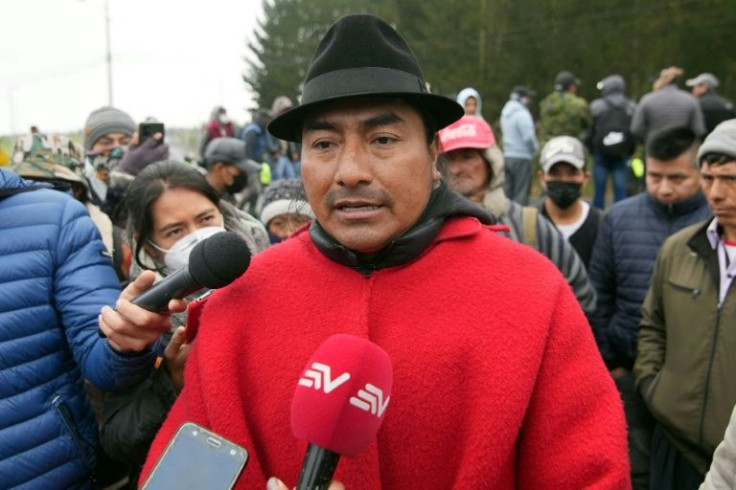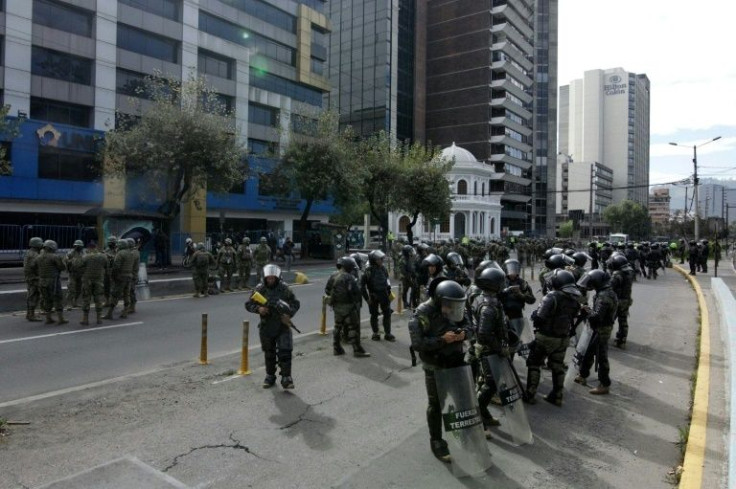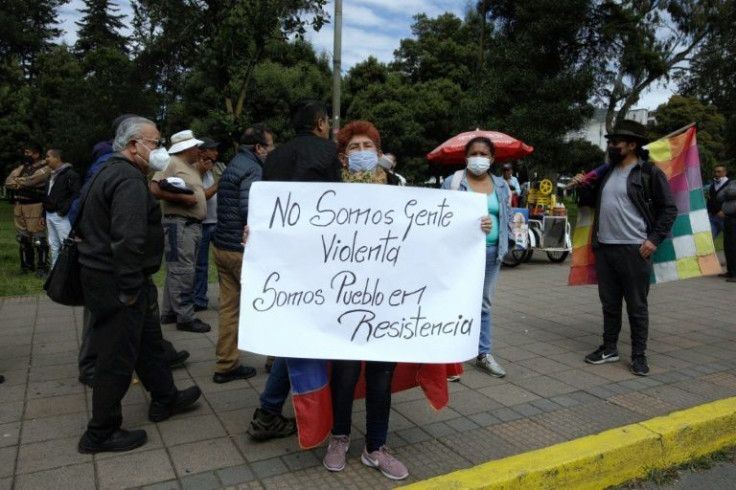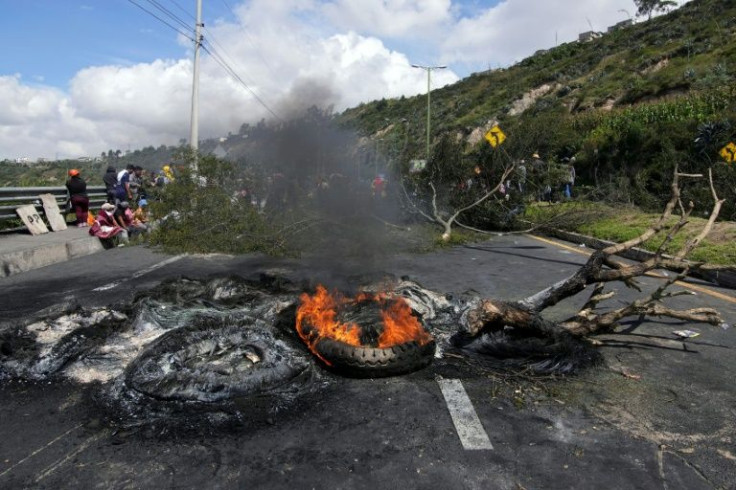Ecuador Judge Orders Release Of Indigenous Leader Amid Protests
An Ecuador judge ordered the immediate release of prominent Indigenous leader Leonidas Iza, his lawyer said early Wednesday, less than a day after he was arrested and accused of paralyzing roads during nationwide anti-government protests.
Demonstrations had kicked off since Monday, as protesters blocked roads with burning tires and barricades of sand, rocks and tree branches in at least 10 of Ecuador's 24 provinces, authorities had said -- partially cutting off access to the capital Quito.
Iza, leader of the powerful Confederation of Indigenous Nationalities of Ecuador (Conaie) -- a group credited with helping topple three Ecuadorean presidents between 1997 and 2005, and was spearheading the movement -- was arrested on suspicions of "sabotage," according to the interior ministry.
But his detention sparked outrage, bringing supporters to the public prosecutor's office to call for his release, with protesters holding signs that read "Freedom for Iza!"

Just after midnight, Iza's lawyer Raul Ilaquiche told AFP a judge had ordered "his immediate release and that he appear periodically before the prosecutor's office" when the trial begins.
Iza is accused of "allegedly paralyzing public transport services" for blocking roads during the anti-government protests, the prosecutor's office said on Twitter, confirming the Indigenous leader's release.
The crime is punishable by up to three years in prison.
But Iza appeared defiant after his release, speaking to a crowd of supporters outside a military base in Latacunga, 90 kilometers (50 miles) from Quito, where he had been held.

"We are not going to be demoralized," he told supporters via a loudspeaker, according to a Facebook livestream.
"We maintain the struggle... we simply wish that those whose rights are being violated are also heard," Iza said.
"Long live the struggle!" they shouted in response.
Hours earlier, Ecuador police in riot gear and soldiers had stood guard outside the public prosecutor's office, clashing with protesters calling for his freedom.

Members of the Indigenous movement said several people were injured when authorities deployed tear gas, while police said their officers were attacked and some were being held captive.
Demonstrations continued in the outskirts of Quito after Iza's release in the early hours of Wednesday, with a long line of trucks and barricades of burning tires blocking access to the capital.
"(We want) to raise our voice and we want the authorities to listen to all the problems that we are going through at this time because of the economic situation," a 50-year-old heavy load hauler told AFP, declining to provide his name.
Iza, a leader of the Kichwa-Panzaleo community, had been arrested in Pastocalle, just south of Quito -- a flashpoint of protests called by Conaie against rising fuel prices and living costs.

One of his lawyers told journalists the arrest had been "violent", and his organization Conai condemned the detention as "arbitrary and illegal".
"We call our organizational structure to a great Indigenous and popular uprising," Conaie tweeted after Iza's arrest.
Besides Iza, four others were detained Tuesday, said Interior Minister Patricio Carrillo, who accused protesters of "paralyzing, looting, kidnapping, attacking" in a way that "the disorder, the chaos, the vandalism causes social unrest."
In 2019, Conaie-led protests resulted in 11 deaths and forced then-president Lenin Moreno to abandon plans to eliminate fuel subsidies.
The group is also credited with helping topple three presidents between 1997 and 2005.
Oil producer Ecuador has been hit by rising inflation, unemployment and poverty -- issues that were exacerbated by the pandemic.
President Guillermo Lasso had warned Sunday the government would not allow roads or Ecuador's oil installations to be taken over by protesters.
By Monday, he denounced protesters of "acts of vandalism," including "the burning of patrol cars, invasions of farms, the breaking of windshields on private and school vehicles, an attack on an oil pumping facility, the cutting off of community water supplies, the closure and serious damage to state roads."
Chinese company PetroOriental said Tuesday protesters had occupied and paralyzed some of its wells in the Amazonian Orellana province, causing a loss of 1,400 barrels of crude per day.
Conaie has taken part in several rounds of fruitless talks with Lasso's conservative government.
Fuel prices have risen sharply since 2020, almost doubling for diesel from $1 to $1.90 per gallon (about 3.78 liters) and rising from $1.75 to $2.55 for gasoline.
Lasso froze fuel prices last October after a round of protests led by Conaie that saw dozens arrested and several people, including police, injured in clashes.
But the freeze failed to assuage simmering anger in a country that exports crude but imports much of the fuel it consumes.
The protesters are also demanding the government address price controls on agricultural products and mining concessions granted in Indigenous territories.
Indigenous peoples make up over a million of Ecuador's 17.7 million inhabitants.
© Copyright AFP 2024. All rights reserved.





















